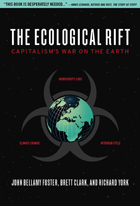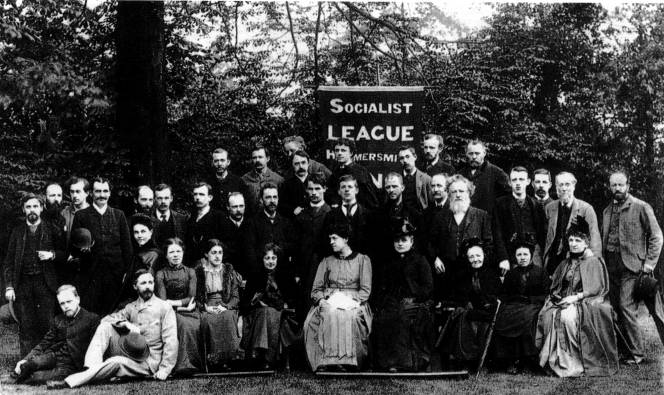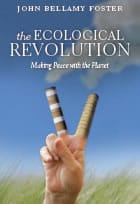Marxism & ecology
`Productivism' or liberation? Socialists debate consumerism

By
Ben Courtice, Melbourne
November 2, 2010 -- In a recent seminar on trade unions and the climate movement, I observed a surprising disagreement between some of the socialists present. It was started by a comment from Melbourne University academic (and Socialist Alliance activist) Hans Baer, who suggested that the “treadmill of production and consumption” had to be challenged, that we need to challenge consumerism and the alienation of work that makes people buy things to feel better.
Liz Ross of Socialist Alternative took umbrage at this, declaring that workers should create and enjoy wonderful technological products, tearing down a straw figure that Hans was supposedly arguing to stultify the creativity of the working class.

October 20, 2010 -- Links International Journal of Socialist Renewal, with the permission of Monthly Review Press, is excited to offer its readers an excerpt from the The Ecological Rift: Capitalism’s War on the Earth, an important new book by John Bellamy Foster, Brett Clark and Richard York. Links' readers are urged to purchase the book. Please click here to order your copy. You can download (in PDF) the chapter, "The ecology of consumption", below the following introduction, or read it on screen.
* * *
The limits to energy efficiency under capitalism

By Simon Butler
October 9, 2010 -- Green Left Weekly -- It is close to an article of faith among environmentalists that using less energy is a big part of the solution to climate change. Energy efficiency is often said to be the “low hanging fruit” of climate policy. On face value, the benefits seem obvious.
The knowledge needed to make big gains in efficiency already exists. Using less energy will save consumers and industry money, whereas other policies will be costly. And most importantly, lower energy use could make a big dent in global greenhouse gas emissions.
The UN Intergovernmental Panel on Climate Change and the International Energy Agency both promote energy efficiency as an important climate measure.
However, strong evidence has emerged that new energy efficient technologies alone won’t do much to cut emissions. Indeed, in a capitalist economy, it’s very likely that energy efficiency gains will lead to higher energy use, not less.
Karl Polanyi provides `a vital intellectual resource' for ecosocialists
To allow the market mechanism to be sole director of the fate of human beings and their natural environment, indeed, even of the amount and use of purchasing power, would result in the demolition of society. For the alleged commodity "labor power" cannot be shoved about, used indiscriminately, or even left unused, without affecting also the human individual who happens to be the bearer of this peculiar commodity. In disposing of a man's labor power the system would, incidentally, dispose of the physical, psychological, and moral entity "man" attached to that tag. Robbed of the protective covering of cultural institutions, human beings would perish from the effects of social exposure; they would die as the victims of acute social dislocation through vice, perversion, crime, and starvation. Nature would be reduced to its elements, neighborhoods and landscapes defiled, rivers polluted, military safety jeopardized, the power to produce food and raw materials destroyed -- from Karl Polanyi's The Great Transformation (1944)
Market greed or a planned economy for human need?
By Dave Holmes
[This is the text of a talk given as part of Melbourne Socialist Alliance’s Socialist Ideas Seminar series on July 28, 2010.]
Is `de-growth' compatible with capitalism?

By Alejandro Nadal
July 15, 2010 -- TripleCrisis -- A serious campaign in favour of “de-growth” has been going on for some time and has made important contributions. This movement has opened new avenues for debate and analysis on technology, credit, education and other important areas. It’s an effort that needs support and attention, and we must applaud their initiators and promoters for their boldness and dedication.
Michael Lebowitz: `We must choose socialism over capitalist barbarism'
Michael Lebowitz was interviewed by Srećko Horvat during the Subversive Film Festival and
Debunking the `Menshevik myth': William Morris and revolutionary politics

The Hammersmith Branch of the Socialist League, William Morris is fifth from the right in the second row.
Can capitalism fix climate change?
By Simon Butler
April 14, 2010 -- Albert Einstein defined insanity as doing the same thing over and over again and expecting different results. It has taken capitalism about 250 years to generate enough waste and pollution to press dangerously against nature’s limits. With such a damning record, there should be no grounds to expect a different outcome in the future.
Yet the mainstream discussion about how to tackle the climate crisis still assumes that, this time around, capitalism can be made sustainable.
In an April 3 Sydney Morning Herald piece arguing for capitalists to take a leading role in resolving the climate crisis, Paddy Manning said it “was an article of faith for this column” that a free market could respond effectively to the challenge of climate change. But, struggling to come up with Australian capitalists responding positively to the challenge, he was forced to admit: “Faith is needed, because climate change is proof of colossal market failure.”
Fourth International: Mobilisation for the climate and anti-capitalist strategy
[The following documents dealing with capitalism's climate crisis were presented at the 16th World Congress of the Fourth International, held in Belgium in February 2010.]
* * *
By Daniel Tanuro
February 2010 -- Three billion human beings lack the essentials of life. The satisfaction of their needs requires increased production of material goods. Therefore increased consumption of energy. Today, 80 per cent of this energy is of fossil origin, and consequently a source of greenhouse gases which are unbalancing the climatic system.
However, we can no longer permit ourselves to unbalance the climate. We are probably no longer very far from a “tipping point” beyond which phenomena which are uncontrollable and irreversible on a human timescale are likely to be set in motion, which could lead to a situation that humanity has never experienced and which the planet has not experienced for 65 million years: a world without ice. A world in which the sea level would rise by approximately 80 metres compared to its level today.
John Bellamy Foster on `Marx's Ecology' and `The Ecological Revolution'

John Bellamy Foster interviewed by Aleix Bombila
Michael Lebowitz: `The Four Rs' of global capitalism
By Michael A. Lebowitz
February 19, 2010 -- Correo del Orinoco -- In Venezuela, people know what the 3Rs stand for: revise, rectify and re-impulse. Like Karl Marx, who stressed that the revolution advances by criticising itself, President Hugo Chavez has argued that it is necessary to recognise errors and to go beyond them in order to advance.